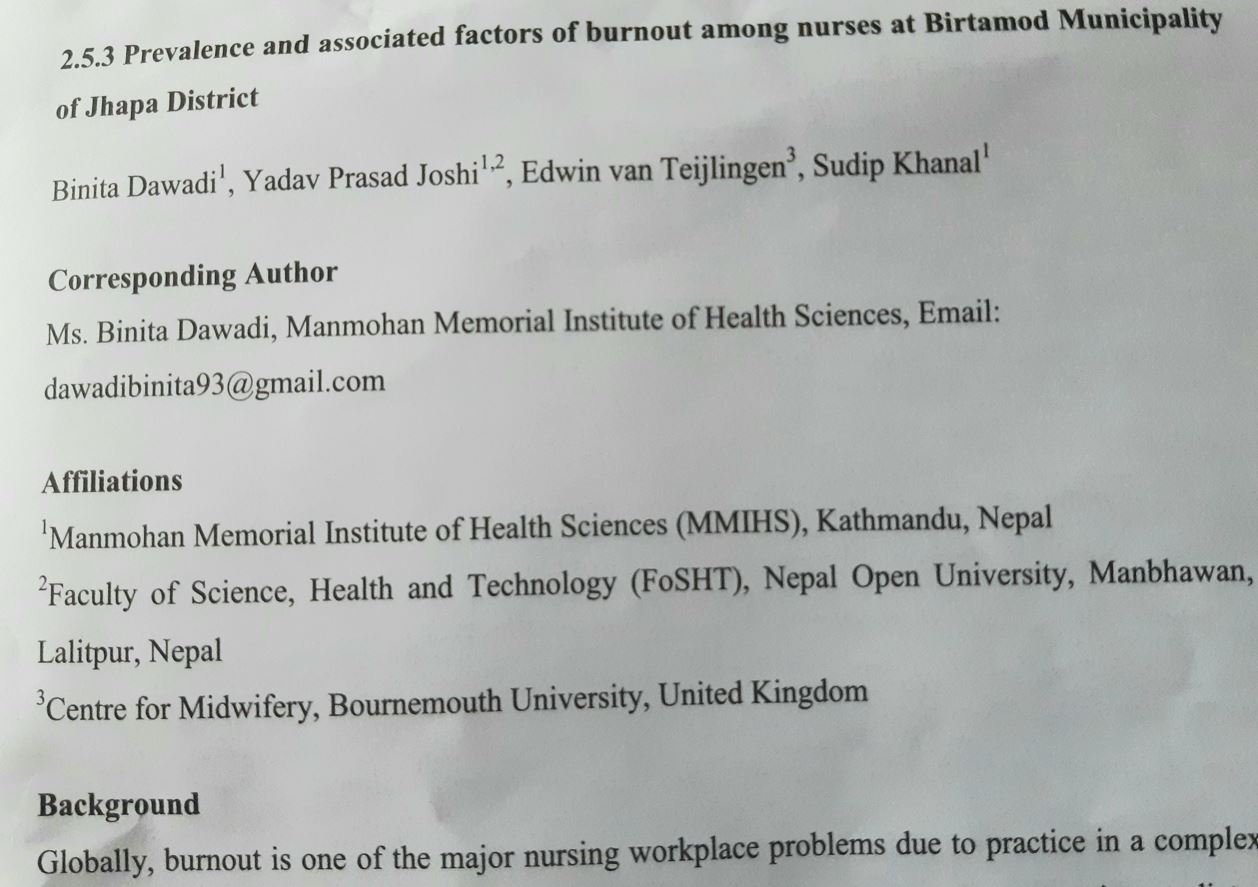 Congratulations to Abier Hamidi on the acceptance of her Ph.D. paper ‘Facilitators and barriers to condom use in Middle East and North Africa: a systematic review’. [1] This review has been registered on PROSPERO. [2] The Journal of Public Health is part of BU’s publishing deal with Springer, hence it will free open access when published.
Congratulations to Abier Hamidi on the acceptance of her Ph.D. paper ‘Facilitators and barriers to condom use in Middle East and North Africa: a systematic review’. [1] This review has been registered on PROSPERO. [2] The Journal of Public Health is part of BU’s publishing deal with Springer, hence it will free open access when published.
Abier is supervised by Dr. Pramod Regmi, Senior Lecturer in International Health and the Global Engagement Lead in the Department of Nursing Sciences, and Prof. Edwin van Teijlingen in the Centre for Midwifery, Maternal & Perinatal Health (CMMPH). Earlier Abier published ‘HIV epidemic in Libya: Identifying gaps’ in 2021. [3]

References:
- Hamidi, A., Regmi, P., van Teijlingen, E. (2023) Facilitators and barriers to condom use in Middle East and North Africa: a systematic review, Journal of Public Health, (accepted)
- Hamidi, A., van Teijlingen, E., Regmi, P. (2021) Facilitators and barriers to condom use in Middle East and North Africa: a systematic review. PROSPERO CRD42021297160
- Hamidi, A., Regmi, P., van Teijlingen, E. (2021) HIV epidemic in Libya: Identifying gaps, Journal of the International Association of Providers of AIDS Care, 20 :1-5 https://doi.org/10.1177/23259582211053964 .
 Two vacancies have arisen for the posts of University Representative, the leaders of the Research Staff Association. This is not a faculty-specific post, any eligible person from any faculty can apply.
Two vacancies have arisen for the posts of University Representative, the leaders of the Research Staff Association. This is not a faculty-specific post, any eligible person from any faculty can apply.
 Pathways
Pathways 


 This 3 Day workshop covers strategies for academic writing: writing to prompts, targeting a journal/specific criteria, types of prompt for academic writing, ‘snack writing’, goal-setting for writing, motivation, freewriting, generative writing, analysing academic writing, drafting and revising an abstract/summary, constructing a ‘contribution’ argument, using prompts in series, outlining, productive writing behaviours, wellbeing, writing groups, micro-groups and retreats. Many of these can be used in preparing for a concentrated spell of writing at a writing retreat.
This 3 Day workshop covers strategies for academic writing: writing to prompts, targeting a journal/specific criteria, types of prompt for academic writing, ‘snack writing’, goal-setting for writing, motivation, freewriting, generative writing, analysing academic writing, drafting and revising an abstract/summary, constructing a ‘contribution’ argument, using prompts in series, outlining, productive writing behaviours, wellbeing, writing groups, micro-groups and retreats. Many of these can be used in preparing for a concentrated spell of writing at a writing retreat. The 2023 Marie Skłodowska-Curie Actions (MSCA) Postdoctoral Fellowships (PF) Call is now open on the
The 2023 Marie Skłodowska-Curie Actions (MSCA) Postdoctoral Fellowships (PF) Call is now open on the 























 New Nepal scoping review on maternal & neonatal health
New Nepal scoping review on maternal & neonatal health Fourth INRC Symposium: From Clinical Applications to Neuro-Inspired Computation
Fourth INRC Symposium: From Clinical Applications to Neuro-Inspired Computation Writing policy briefs
Writing policy briefs Upholding Excellence: The Concordat to Support Research Integrity
Upholding Excellence: The Concordat to Support Research Integrity ECR Funding Open Call: Research Culture & Community Grant – Application Deadline Friday 12 December
ECR Funding Open Call: Research Culture & Community Grant – Application Deadline Friday 12 December MSCA Postdoctoral Fellowships 2025 Call
MSCA Postdoctoral Fellowships 2025 Call ERC Advanced Grant 2025 Webinar
ERC Advanced Grant 2025 Webinar Horizon Europe Work Programme 2025 Published
Horizon Europe Work Programme 2025 Published Horizon Europe 2025 Work Programme pre-Published
Horizon Europe 2025 Work Programme pre-Published Update on UKRO services
Update on UKRO services European research project exploring use of ‘virtual twins’ to better manage metabolic associated fatty liver disease
European research project exploring use of ‘virtual twins’ to better manage metabolic associated fatty liver disease